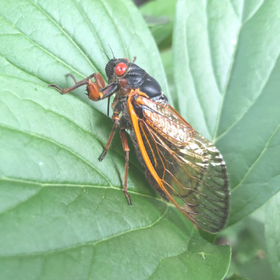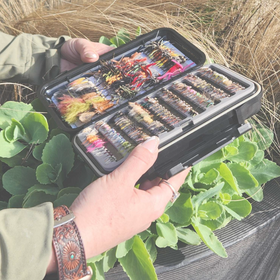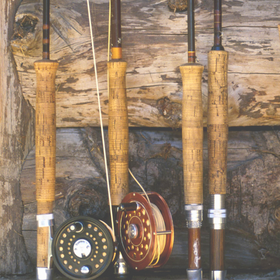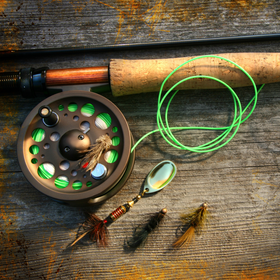To Shop Terrestrials Click Here
Hatches; mayflies, caddis, stoneflies. Fly fishers wait for them, vacations are planned around them, and flies are purchased just for them. (For that we are grateful.) Their story is well documented in our world; larva, pupae, emergers, duns, spinners, rinse repeat; as timeless as the seasons.
Amid the focus and the glory of the hatch though is another source of food for trout. Born outside of water, together they make up a group we call terrestrials.
Beetles, Ants, Hoppers, Crickets, Cicadas, all are common, very common. Terrestrials all are important trout food sources. And many a fly fisher believe they are preferred by trout.
 - Beetles are a great source of protein for trout, and they are found everywhere.
- Beetles are a great source of protein for trout, and they are found everywhere.Terrestrials are available from the spring start of traditional trout season to the bitter end. They are, however, unpredictable the caddis hatches that you can set your watch to. Ant ‘falls’ are notorious for being prevalent one day and mysteriously absent the next. But ant falls are often accompanied by the most zealous trout frenzy you are likely to encounter: fearless trout devouring ants trapped in the surface film. The same thing can be said for beetles. While it is rare to see a predominance of beetles on the water, it appears to observant anglers that they are a trout favorite. Beetles can be fished any time as there seems to be enough of them to keep trout interested. They are a great nutritious meal and either that or their taste keeps them in the fishing game year around. When fish are swirling and you cannot interest them with mayflies, caddis or stones, a beetle is just the ticket to entice a strike. Even submerged beetles are eaten with reckless abandon.
 - Ants have a propensity to fall into lakes and rivers.
- Ants have a propensity to fall into lakes and rivers.
When most people think of terrestrials, the first one that comes to mind are grasshoppers. Hoppers are obvious to spot, and it is easy becomes excited by their presence. Or maybe we hearken back to days of catching them on the school yard during recess. Whatever the reason, hoppers are exciting. There are many species of hoppers. Some are excellent fliers and therefore supply little food to trout. Others are clumsy though; a little wind and overhanging brush can make them a steady food source for downstream trout. Plus, as the weather cools, they become even more sluggish and easier prey.
 - Trout look for grasshoppers for two to three months every year.
- Trout look for grasshoppers for two to three months every year.
 - Crickets are an overlooked and underfished insect.
- Crickets are an overlooked and underfished insect.
Crickets and Cicadas often find the same fate as their hopper and beetle brethren. Their numbers are often peaking early in the summer when fish are just getting into the zone and looking for as much food as they can get as they shrug off the last of their slower winter metabolism. Cicadas are definitely more regional than hoppers, ants and beetles. Many locations do not have populations of these tasty treats, as they prefer deciduous, hardwood forests of the midwest and eastern US over the evergreens that cover much of the west.
 - Cicadas swarms can be massive, and the trout know that. (photo: www.troutnut.com)
- Cicadas swarms can be massive, and the trout know that. (photo: www.troutnut.com)
Crickets are found just about everywhere that we fish in the US, but often in smaller numbers than we'd like to see to stoke our confidence. Although you may not see them, you can often hear their chirp, and if you can hear the chirping of crickets, and you are on the river, chances are good that you can have success with a cricket pattern. It is a great alternative when you show up on that trip expecting a salmonfly hatch and it just isn't there.
Make sure that you have a couple of each of the terrestrials in your box.... and use them! Many anglers never try them and then wonder why fishing wasn't as good as it should have been!




